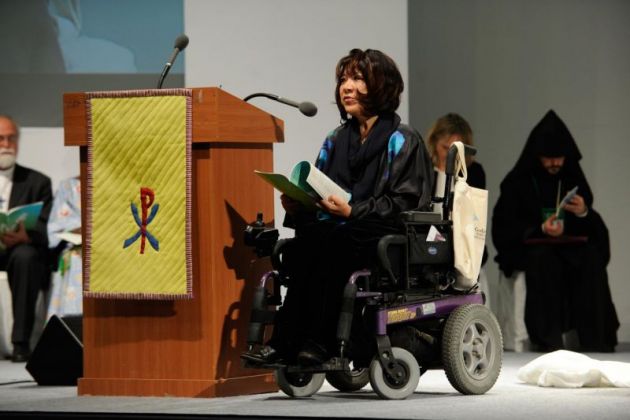World churches mourn loss of Lynda Katsuno, pioneer for those with disability

Churches around the world are mourning the death of Rev. Lynda Susan Katsuno, Ecumenical Disability Advocates Network pioneer, after a yearlong struggle with cancer, but a life not letting her wheelchair slow down her cause.
Katsuno, who died on Aug. 28, aged 72, was a third-generation Japanese Canadian who had a permanent physical disability from 1973.
From 1970 to 1983, she was an elementary school teacher in Toronto, Canada, and a member of the Anglican Church of Canada, but she also did much work with the United Church of Canada, according to the World Council of Churches..
"Many of us who were there in the 1980s will remember her crisscrossing the corridors of the Ecumenical Centre in her wheelchair and her precious contributions to the celebrations in the chapel," recalled Hubert van Beek.
Van Beek worked at the World Council of Churches (WCC) from 1992 to 2004 in the Church and Ecumenical Relations office.
Katsuno was a liturgist and musician and pioneered what is now the Ecumenical Disability Advocates Network.
Van Beek noted, "And there was, for her, no place in the world where she would not travel."
"Once she called from the Frankfurt airport to say that she had broken her leg," he recalled.
"It turned out to be a wheel of her chair, and she gave the people from a church in Frankfurt, where she had called for help, no rest until it was repaired and she could continue her journey."
Anjeline Okola, program coordinator for the WCC Ecumenical Disability Advocates Network, recalled Katsuno as a dynamic woman in the ecumenical movement.
She was said Okola, despite being a paraplegic, in air travel terms, a "complete carry-on" who loved traveling and interacting with the churches on disability inclusion.
"Having pioneered the work on disability inclusion within WCC, she paved the way for the current work within the WCC and her member churches," said Okola.
"She was 'our' liturgist whom we gladly shared with other ecumenical partners whenever there was a big gathering anywhere in the world and it was not surprising finding her liturgy being used in places that she had not been," said Okola.
Katuson's liturgy always had a life of its own, going to places where the prayers, readings, and music she wrote were needed "for the worship life of the faithful."
Okola added: "All she needed was the concept paper and the Biblical text after which she could come up with a beautiful liturgy that enhanced our worship life while at the same time celebrating and strengthening our faith journey. We will surely miss her."
WCC ASSEMBLY IN VANCOUVER
Following the WCC 6th Assembly in 1983 in Vancouver, Canada, she joined the WCC staff, staying in Geneva until the end of 1991 and officially forming the "desk" that worked on the issues of disabilities.
"My love and passion for music and liturgy became a huge part of the work I did for the WCC, along with a commitment to women's concerns," Katsuno wrote.
After moving back to Canada, she wrote and facilitated daily worship for the 1988, 1994, and 1997 Triennial Assemblies for the Canadian Council of Churches.
She also wrote for the 1991 International Assembly for the global YMCA (held in Seoul), the International Assembly of the World Association of Christian Communicators held in 1995 in Bangkok, along with many conferences and gatherings for the Anglican and United Church of Canada.
She worked with her parish team for a Toronto-based program called, "Out of the Cold," which provides a home-cooked meal and overnight shelter during the winter months for people who call the streets of Toronto "home."
A Requiem Mass was held for Katsuno on Sept. at the church of St Mary Magdalena, her home parish.
